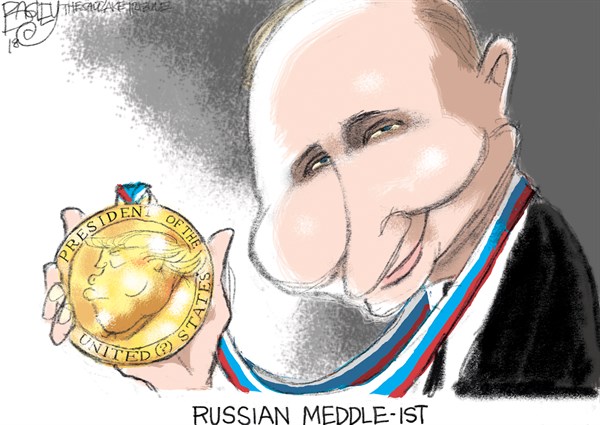
WASHINGTON — President Trump is right about one thing: They must be “laughing their asses off” in Moscow.
At him.
Faced with compelling evidence that Russian cyber-saboteurs worked to sway the 2016 election, influencing swing-state voters with lies on social media and even staging real-life campaign rallies, Trump’s only response has been a frantic and pathetic attempt to protect his own delicate ego. “But wasn’t I a great candidate?” he pleaded Sunday on Twitter.
Protecting our democracy obviously concerns Trump not at all. But you’re probably not surprised.
In a stunning indictment announced Friday, Special Counsel Robert Mueller laid out in painstaking detail how a group of paid internet trolls based in St. Petersburg, Russia, worked diligently to “sow discord in the U.S. political system.” They began with the aim of creating general mischief, but “by early to mid-2016, Defendants’ operations included supporting the presidential campaign of then-candidate Donald J. Trump (‘Trump Campaign’) and disparaging Hillary Clinton.”
There it is, in black and white: Trump was elected with the active help of Russian President Vladimir Putin. While Putin is not named as a co-conspirator, the man behind the scheme — an oligarch named Yevgeniy Prigozhin — is a longtime crony known in Russia as “Putin’s chef.” The idea that he would meddle in a U.S. election without orders from Putin is ludicrous.
The 13 named defendants are presumably in Russia, beyond the reach of U.S. justice. Mueller’s account of what they allegedly did is simply infuriating. Voters who saw the Russians’ Facebook, Instagram and Twitter posts were led to believe they were being lobbied by their fellow citizens — not by an adversarial foreign power.
They tried to convince Muslim voters that Clinton was anti-Islam and convince anti-Muslim voters that she favored imposing sharia law. They tried to suppress the African-American vote with an Instagram account named “Woke Blacks” that called Clinton “the lesser of two devils” and argued “we’d surely be better off without voting AT ALL.” They purchased online ads calling Clinton “a Satan,” falsely accusing her of voter fraud and claiming that “Donald Trump is the one and only [candidate] who can defend the police from terrorists.”
They organized and promoted actual pro-Trump and anti-Clinton rallies in Florida, North Carolina and Pennsylvania, according to the indictment, and they targeted their social media campaigns at other swing states. To pay for all of this, they established fraudulent U.S. identities and bank accounts so that no one would know they were heeding political advice from Russians employed by “Putin’s chef.”
Mueller’s big splash sent Trump into a full-fledged Twitter conniption that by Monday showed no sign of easing. It would be a waste of space to quote all of Trump’s bleating, but basically he tried to claim that the indictment proves two things: Whatever the Russians did or didn’t do, they had no impact on the outcome of the election; and there was no collusion — or as Trump would put it, NO COLLUSION — between the Russians and the Trump campaign.
Deep down, he must know the indictment says nothing of the sort.
Of course the Russians had some impact. If communicating via Facebook, Instagram and Twitter were a useless way to influence voters, campaigns wouldn’t bother with social media strategies. If rallies didn’t produce votes, campaigns would find better uses for the money and effort it takes to stage them.
It is true that it’s impossible to say how much impact this element of the Russian meddling offensive had. Would it have made a difference if more African-Americans had voted in the Rust Belt states that Trump unexpectedly won? Or if fewer progressives had voted for the Green Party’s Jill Stein, whose candidacy the Russians worked hard to boost? Perhaps some clever political science professor will figure it all out someday.
As for collusion, it’s true that Mueller does not allege that anyone from the Trump campaign knowingly participated in the Prigozhin conspiracy. But the Russians did much more: Intelligence officials say they hacked into the email accounts of the Democratic National Committee and Clinton campaign chairman John Podesta, and then leaked that material to do maximum damage to Clinton’s prospects. We don’t know if there was collusion in that scheme — or in other schemes we might not yet know about.
Late Saturday night, well past his usual bedtime, Trump was wide awake and still tweeting: “The only Collusion was between Russia and Crooked H, the DNC and the Dems. Remember the Dirty Dossier, Uranium, Speeches, Emails and the Podesta Company!”
Stop laughing, Vladimir Putin. You’ll hurt yourself.
Eugene Robinson’s email address is [email protected].(c) 2018, Washington Post Writers Group
















